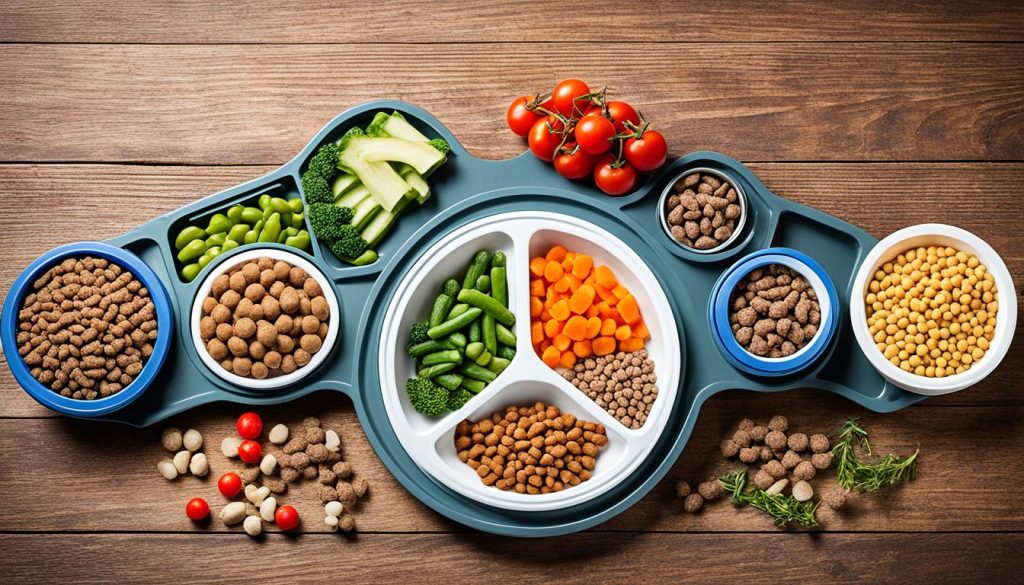As a devoted pet parent, ensuring your canine companion receives optimal nutrition is a top priority. Navigating the specifics of accurate feeding portions isn’t just about satisfying hunger; it’s about promoting lifelong health and wellness. An essential piece of nutritional management is understanding how food measurements translate into the nourishment for your pet. Particularly, discerning cups in a pound of dog food allows for consistent, healthy feeding practices. This article offers insight into the fine balance of meal portions, guaranteeing that your dog’s tail keeps wagging at dinner time.
Key Takeaways
- Evaluating the accurate feeding portions contributes to the overall health of your dog.
- Understanding cups in a pound of dog food assists in providing consistent meal sizes.
- Awareness of proper food measurements is crucial for preventing overfeeding or underfeeding your canine companion.
- Recognizing the difference in volume measurements can be key to administering a balanced diet.
- Ensuring precise feeding habits paves the way for a happy, healthy, and energetic canine companion.
Understanding Dog Food Measurements for Proper Nutrition
Administering proper nutrition to your dog begins with understanding dog food measurements, a pivotal factor in maintaining their overall health. As pet owners, we have a responsibility to provide our dogs with accurate food portions to avoid overfeeding and underfeeding, which can lead to health issues. The right balance of nutrients is only achievable through precision in measuring both dry and wet dog food. In this segment, let’s delve into why exact portioning matters and how it contributes to the vitality of your furry friend.
The Importance of Accurate Food Portions
Why are accurate food portions significant? Each dog has unique dietary requirements, influenced by their size, age, and activity level. Feeding them the correct amount of food is essential not only for their day-to-day energy but also for their long-term health and weight management. Inaccurate measurements can lead to obesity or malnutrition, both of which carry risks for conditions such as diabetes, heart disease, and arthritis. As conscientious caregivers, adhering to measuring guidelines is an act of love and care for our pets.
Difference Between Dry and Wet Dog Food Measurements
The distinction between measuring dry and wet dog food is more than texture and preference. Dry food is typically denser and requires different measuring criteria compared to the less concentrated, more volume-occupied wet food. It’s important to note that a cup of dry kibble could have nearly twice the calories of a cup of wet food, making the measurement process a critical factor for maintaining your dog’s diet plan.
Guidelines for Measuring Dog Food
Following measuring guidelines can simplify the selection of appropriate dog food measurements. As a rule of thumb, start by checking the feeding recommendations provided by the dog food manufacturer, which are usually based on weight. Yet, these suggestions can be overgeneralized and may not perfectly align with every dog’s needs. Here is where a consistent measuring device, such as a standard measuring cup, becomes invaluable, ensuring you dispense the same amount of food at each meal, every day.
To enhance your dog’s health and your peace of mind, weigh the food portions for precision or use specially designed dog food measuring cups. Adjust portions based on your dog’s body condition score, a method used by veterinarians to assess whether a pet is underweight, overweight, or at an ideal body weight. Consulting with your vet periodically to refine food portions as your dog ages is an effective approach to keep them thriving throughout their life stages.
How Many Cups in a Pound of Dog Food: The Essential Conversion
As a dedicated pet owner, understanding the essential conversion of cups in a pound of dog food is imperative for maintaining the health of your canine companion. Typically, for dry dog food, the standard rule of thumb is that one pound of dog food roughly equates to four cups. However, this isn’t a one-size-fits-all measurement. Various factors such as the density and shape of the kibble can alter this ratio, necessitating a more nuanced approach when measuring your dog’s meals.
The true measure can vary; for instance, a pound of densely packed dry dog food may only yield three cups, while a lighter, less dense brand could give you closer to five cups. It’s crucial to check the packaging of the product you’re using for its specific conversion guidelines, which are often provided by the manufacturer. Adapting to these specifications is an important step in assuring that your pet receives the ideal amount of nutrition as advised by professionals and the feeding guidelines set by the dog food brand.
Ultimately, the goal is a well-nourished pet, and that begins with precision in the essential conversion of cups in a pound of dog food. By comprehending this crucial aspect of pet care, you’re laying the groundwork for a healthy diet regimen for your furry friend. It’s a simple but significant step that contributes to your dog’s overall health and happiness. As always, consult your veterinarian regarding your pet’s specific dietary needs, as they can provide personalized advice that takes into account factors such as age, activity level, and breed.


